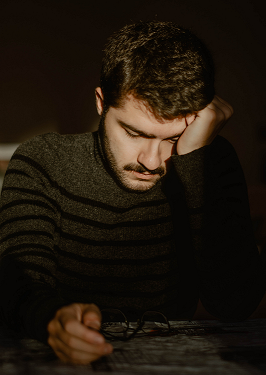World Depression Day is commemorated on January 13 to raise awareness and talk openly about depression, which affects more than 300 million people worldwide. According to the WHO, it will become the most important disease worldwide by 2030.
How to identify the signs of depression?
People experience different levels of depression: mild, moderate or severe. According to the Spanish Society of Psychiatry and Mental Health (SEPSM), you can identify some of the following signs of depression:
- On a mental level, you feel unhappy, or depressed. This feeling does not go away and may be worse at any given time of the day. You can’t enjoy anything, you lose interest in seeing people and you lose contact with friends. You cannot concentrate properly and find it more difficult to make decisions. You lose confidence in yourself. You feel guilty, become pessimistic and start to feel hopeless.
- As for your body, you feel restless, nervous or agitated; or you feel exhausted and without energy. You can’t sleep or you sleep too much. You wake up early in the morning and/or during the night. You have a headache or upset stomach. You can’t eat and lose weight. Or on the contrary, you eat out of anxiety and gain weight.
- Other people may notice that you make mistakes at work or cannot concentrate. You seem unusually quiet and withdrawn, or you avoid people. You worry about things more than usual. You are more irritable than usual. You stop taking proper care of yourself: you don’t wash your hair or wear clean clothes. You stop taking proper care of your home: you don’t clean, don’t tidy up, or forget to change the sheets.
Some people may not realize how depressed they are. Sometimes it takes someone else to convince them that there really is a problem and suggest that they seek help.
A good time to ask for help is when these factors are present:
- Feelings of depression affect your studies or work, your interests, and your feelings toward your family and friends.
- Symptoms of depression last for a while and don’t seem to be getting better.
- You feel that life is not worth living or that others would be better off without you.
How can I help myself?
Whether your depression is mild or moderate, here are some suggestions you can try when you are feeling depressed. It is important that you find what works best for you. However, when depression is more severe, the inability to do activities is a symptom and you should not feel guilty about it. This will go away when the depression improves.
- Talk to someone: if you have received bad news or a major upset, try not to bottle things up. It can be helpful to tell someone close to you how you feel.
- Be active: if you can, exercise, even if it’s just walking. This will help you stay physically fit and sleep better. It can also help you focus on other things and not on painful thoughts.
- Eat right: You may not be very hungry, but try to eat regularly. It’s easy to lose weight and run out of vitamins when you’re depressed, or eat too much junk food and put on weight. A balanced diet, with lots of fruit and vegetables, can help keep your body and mind healthy.
- Avoid alcohol and drugs: Alcohol and drugs make depression worse in the long run.
- Create a sleep routine: Try to go to bed at the same time every night and get up at the same time every morning. Do something you enjoy before bedtime, such as listening to relaxing music or reading a book.
- Try relaxing activities: If you feel tense all the time, try relaxation exercises, yoga, massage, aromatherapy or another relaxing activity.
- Do something you enjoy: Take time to do something you really enjoy, such as reading, listening to music or another hobby.
- Read about depression: There are many books and official websites about depression. They can help you understand what is going on with you and give you strategies to cope better.
- Be kinder to yourself: You may be a perfectionist who tries too hard. Try setting more realistic goals or expectations.
- Take a break: It can be very helpful to get away and get out of the normal routine for a few days. Give yourself a break from daily stress and worries. If you can change your surroundings, even for a few hours, it can help.
- Join a support group: It can be hard to help yourself when you are depressed. Talking to others in a similar situation can help.
- Remember that there are many other people who have had depression and have recovered. You have the right to get the help you need to feel better.
What help can I get for depression?
If trying to get better on your own doesn’t work as well or as quickly as you’d like, it may be a good idea to talk to a doctor or mental health specialist to review your symptoms and find out what treatments are right for you.


